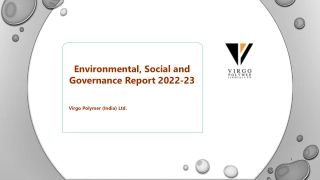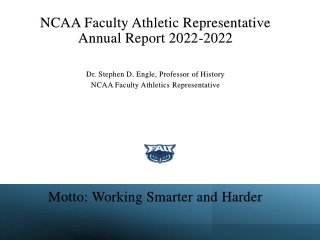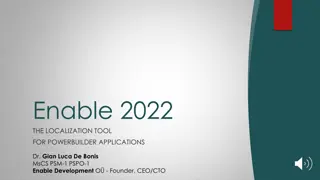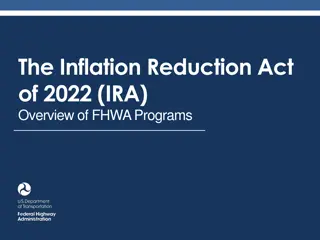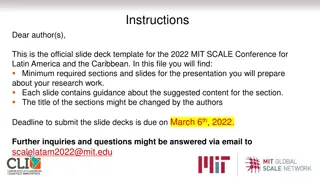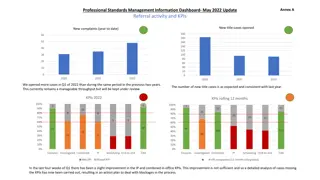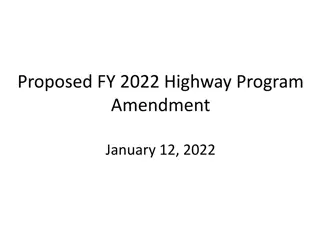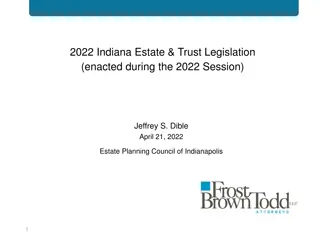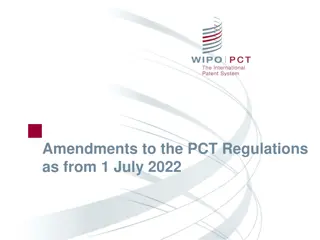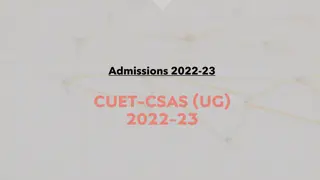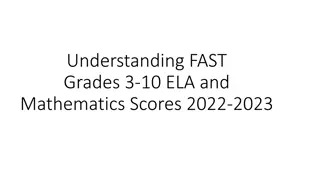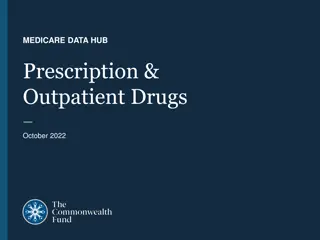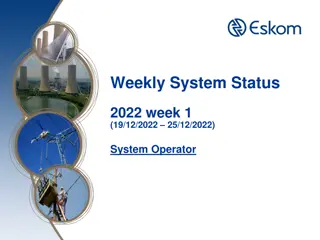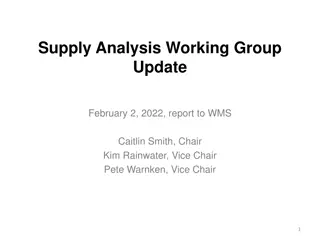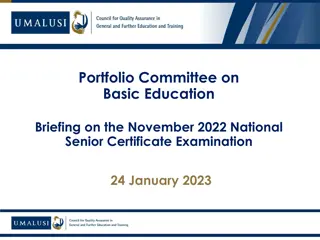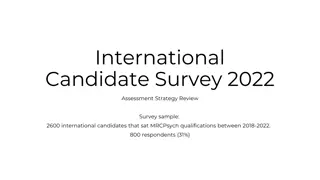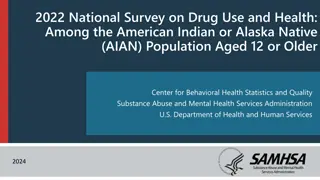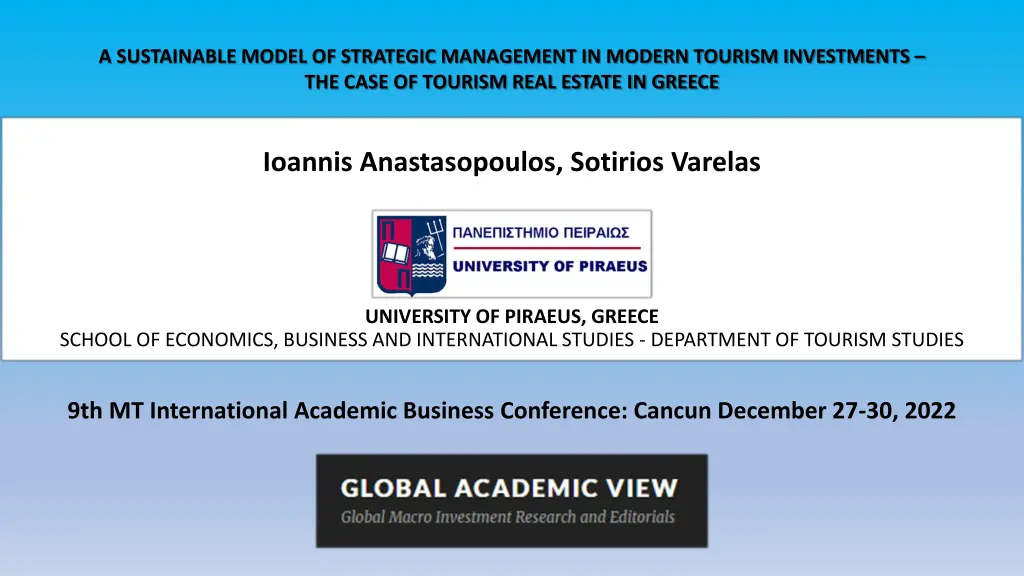
Strategic Management in Modern Tourism Investments: A Sustainable Model for Tourism Real Estate in Greece
Explore the challenges and opportunities in modern tourism investments, specifically focusing on sustainable strategic management in tourism real estate in Greece. Learn about the importance of strategy and sustainability in the ever-changing global tourism landscape, enhancing decision-making processes for investors and promoting sustainable development goals.
Download Presentation

Please find below an Image/Link to download the presentation.
The content on the website is provided AS IS for your information and personal use only. It may not be sold, licensed, or shared on other websites without obtaining consent from the author. If you encounter any issues during the download, it is possible that the publisher has removed the file from their server.
You are allowed to download the files provided on this website for personal or commercial use, subject to the condition that they are used lawfully. All files are the property of their respective owners.
The content on the website is provided AS IS for your information and personal use only. It may not be sold, licensed, or shared on other websites without obtaining consent from the author.
E N D
Presentation Transcript
A SUSTAINABLE MODEL OF STRATEGIC MANAGEMENT IN MODERN TOURISM INVESTMENTS THE CASE OF TOURISM REAL ESTATE IN GREECE Ioannis Anastasopoulos, Sotirios Varelas UNIVERSITY OF PIRAEUS, GREECE SCHOOL OF ECONOMICS, BUSINESS AND INTERNATIONAL STUDIES - DEPARTMENT OF TOURISM STUDIES 9th MT International Academic Business Conference: Cancun December 27-30, 2022
Introduction Hellinikon real estate development project, Attica, Greece The challenges facing modern tourism investments in an ever-changing, globalised environment with rapid technological developments, bringing new models of corporate governance and decision-making, make strategy and sustainability essential for their development (Gopy-Ramdhany, Seetanah and Bhattu-Babajee, 2022). The strategic management approach, in general, but also specifically in the tourism real estate sector, whether in terms of research, teaching or the development of corresponding investments, is at low levels of utilization (Kaklauskas et al., 2021). For the dynamic restart of tourism in the post-Covid-19 era, businesses need to strategically set their goals - promoting sustainable development and the means to achieve them (Varelas S., and Georgopoulos N., 2017). The creation of research strategy model using sustainability-based factors would make a significant contribution to this research area. This new model of tourism investment is considered a special tourism product with specific characteristics in terms of incentives to combine traditional holidays with a number of specialised by-products to meet the leisure needs of the visitor. The aim is to create win-win symbiotic relationships for the benefit of all stakeholders while ensuring a positive valuation of the country, the assets of the tourism units and minimising risks for investors (HVS Report, 2020).
Internationally, the logic of real estate in tourism is activated by economically developed societies and is linked to the socio- economic well-being of the place (Post et al. and Freeze, 2022) The most prevalent forms of tourism real estate include condominium hotels for room/apartment use (condo hotels), destination clubs, private residence clubs, franchise ownership and holiday ownership (Kabil et al. and D vid, 2022) It is worth mentioning that Greece has gained experience with Integrated Destination Resorts. In fact, the development of luxury tourism is rapidly evolving in the global travel industry and the creation of new Integrated Destination Luxury city hotels will bring very high profits (Katemliadis and Papatheodorou, 2021) In confirmation of the report we made, new luxury hotels that combine tourism and real estate, in addition to all amenities, will soon become a reality. Some of them are located in attractive destinations such as: Messinia, Thessaloniki, Halkidiki, Corfu, Mykonos, Santorini, Paros, Kyllini, Chania, Heraklion, Lassithi, Rethymno (Vagena, 2022) Map of the Greek Territory Costa Navarino Residences, Messinia, Greece
Research Questions This study intents to examine the following topics: The current maturity of the applications of the analysis of the factors influencing the decision-making of the investors regarding tourism real estates. The research deficit that exists, based on the literature, on the application of strategic planning for the development and growth of businesses, particularly when they pursue sustainable actions and innovative forms of tourism investment. The creation of a model that will be an important strategic decision-making tool for investors for corresponding real estate investments. The novelty of this study lies in the fact that it studies not only from the point of view of investors and the performance of specific investments, but also from the point of view of sustainable development. On the basis of this process, we will try to create a business model through the promotion and support of tourism investments that contribute to the local community, the environment and the culture of a region, while being an integral part of a sustainable value chain. The impact of the coronavirus pandemic on tourism real estate properties highlights the new virtual reality technologies in the tourism investment sector as a necessary tool for their sustainable development and the personalised experience they need to offer users, taking into account health protection measures. Identify the problems that hinder the development of a tourism investment in terms of tourism real estate (bureaucracy, land use, environment, etc.). Identify the factors that create a favourable environment for attracting investment (financial instruments, etc.).
Theoretical Background Sustainable development very recently began to be considered an integral part of a company's management strategy (Carcano, 2013). Strategic management is therefore very important, because through it the long-term activities of a company are planned in order to make it more efficient and competitive (Ifaistou, 2019). It supports the economic development of the country. It also contributes to the preservation of cultural and natural heritage and the harmonious coexistence of people in the new globalised environment (Hall and Seyfi, 2021). SUSTAINABLE MODEL OF STRATEGIC MANAGEMENT IN MODERN TOURISM INVESTMENTS Through sustainable development, three key principles are promoted that focus on: environmental integrity, economic prosperity and social equity - commonly referred to as the three pillars of sustainability (Barbier, 1987; Elliott, 2005). Decarbonisation of buildings sector Enhancing operational performance Enhancing climate resilience in buildings and cities (Ogunmakinde, Egbelakin and Sher, 2022)
Methodological approach / Research study Objective The research focuses on: Capture the current maturity of the applications of the analysis of the factors that influence the decision making from the investors' point of view regarding tourism real estate. Analyze the current models of utilization of strategic management in tourism real estate and its connection with sustainability. Identify the problems that hinder the development of a tourism investment in terms of tourism real estate (bureaucracy, land use, environment, etc.). Identify the factors that create a favourable environment for attracting investment (financial instruments, etc.). Explore areas where sustainability plays a key role in the sustainability of these real estate investments. Utility of those strategic axes for investment in tourism real estate that lead to a strong competitive advantage by providing access to new business opportunities and new markets. Support the integration of tourism real estate investments in the sustainable value chain, helping to design tailor-made solutions for the tourism industry sector.
Methodological approach / Research study Method Qualitative research methods will be applied in combination with quantitative research. The combination of these two research methods was chosen with the ultimate aim of gaining an in- depth understanding of the topic under study. The completion of questionnaires and interviews is deemed necessary in order to capture the fundamental aspects of real estate tourism investment. In particular, questionnaires will be sent to a large number of real estate investment groups in order to gather a satisfactory sample of responses. It should be noted that, semi-structured interviews will be conducted not only with top management, but also with people at lower levels of the management hierarchy of the companies.
Recommendations The upgrading of the country's public infrastructure is one of the most important factors for its development and competitiveness tourism real estate sector. The development of transport infrastructure, including the road and rail network, ports, marinas and coastal transport, airports and air transport, as well as in the fields of telecommunications and health is a prerequisite for the promotion of specific areas of the country in notable tourist destinations. Achieving upgraded public infrastructure and consequently the tourism product requires a long-term, structured and coordinated national policy. (Kabil and D vid, 2022).
Policy Implementations The proper promotion of tourism investments and tourism real estate is another axis of action on which all stakeholders need to focus. Every promotion and policy action must be specific and innovative, depending on the target audience, be the result of a thorough study and highlight the specific characteristics of each region. Tourism and tourism real estate are two interconnected and interdependent industries. The existence of loss-making tourist units as well as the problems related to seasonality, spatial planning, bureaucracy all have a common denominator, the wrong mentality and lack of entrepreneurship. Proposals and solutions must be researched both for the problems that exist to improve the infrastructure of tourism real estate properties and infrastructure in general, as well as for the extension of the tourist season and the improvement of spatial planning, the elimination of bureaucracy and urban planning problems. What is needed is a coordinated effort from all sides to achieve the best possible result and take off tourism real estate in Greece (Lazoglou and Angelides, 2020).
References Gopy-Ramdhany, N., Seetanah, B., & Bhattu-Babajee, R. (2022). Analysing the relationship between foreign real estate investment and tourism development. Journal of Policy Research in Tourism, Leisure and Events, 14(2), 131- 147. Varelas S., Georgopoulos N., (2017). Porter's Competitive Forces in the Modern Globalized Hospitality Sector - The case of a Greek Tourism Destination. Journal of Tourism Research, vol. 18(1), pages 122-132, November. Kaklauskas, A., Zavadskas, E. K., Lepkova, N., Raslanas, S., Dauksys, K., Vetloviene, I., & Ubarte, I. (2021). Sustainable construction investment, real estate development, and COVID-19: a review of literature in the field. Sustainability, 13(13), 7420. Lamba M., Datta A., and Mohan D., (2020). HVS Report Mixed-use Development. Post, H., Knollenberg, W., Schroeder, A., Seekamp, E., & Freeze, J. (2022). Strategies for building diverse tourism advocates. Tourism Management Perspectives, 42, 100967. Kabil, M., Abouelseoud, M., Alsubaie, F., Hassan, H. M., Varga, I., Csob n, K., & D vid, L. D. (2022). Evolutionary Relationship between Tourism and Real Estate: Evidence and Research Trends. Sustainability, 14(16), 10177. Katemliadis, I., & Papatheodorou, A. (2021). The Importance of Tourism for the Greek Economy: Traits and Development. In Modeling Economic Growth in Contemporary Greece. Emerald Publishing Limited.
Vagena, A. (2022). An upcoming destination for tourism investments, digital nomads and relocation: Greece. Carcano L., (2013). Strategic Management and Sustainability in Luxury Companies: The IWC Case. The Journal of Corporate Citizenship, No. 52 (December 2013), pp. 36-54 (19 pages). ., (2019). : . . , & . . . Hall, C. M., & Seyfi, S. (2021). Tourism and sanctions. In Research Handbook on Economic Sanctions. Edward Elgar Publishing. Barbier E., (1987). The concept of sustainable economic development. Environmental Conservation, 14(2), 101 110. Elliott S.R., (2005). Sustainability: An economic perspective. Resources, Conservation and Recycling, 44(3), 263 277.
Ogunmakinde, O. E., Egbelakin, T., & Sher, W. (2022). Contributions of the circular economy to the UN sustainable development goals through sustainable construction. Resources, Conservation and Recycling, 178, 106023. Kabil, M., Abouelseoud, M., Alsubaie, F., Hassan, H. M., Varga, I., Csob n, K., & D vid, L. D. (2022). Evolutionary Relationship between Tourism and Real Estate: Evidence and Research Trends. Sustainability, 14(16), 10177. Lazoglou, M., & Angelides, D. C. (2020). Development of a spatial decision support system for land-use suitability assessment: The case of complex tourism accommodation in Greece. Research in Globalization, 2, 100022.
Thank you Thank you for your for your attention attention E E- -mail mail ganast@unipi.gr ganast@unipi.gr

